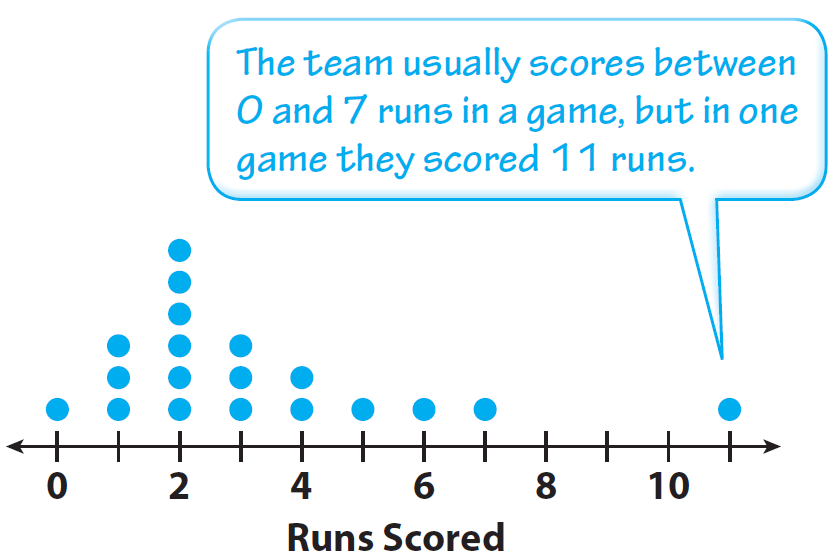DOT PLOTS AND DATA DISTRIBUTION
Subscribe to our ▶️ YouTube channel 🔴 for the latest videos, updates, and tips.
A dot plot is a visual representation of data using intervals or categories of variables; the dots represent an observation in the data.
The data distribution is a listing or function showing all the possible values (or intervals) of the data and how often they occur.
Example 1 :
A baseball team manager records the number of runs scored by the team in each game for several weeks.
1, 3, 1, 7, 2, 0, 11, 2, 2, 3, 1, 3, 4, 2, 2, 4, 5, 2, 6
(i) Make a dot plot to know how the data is distributed.
Solution :
Step 1 :
Make a number line.
Data values range from 0 to 11, so use a scale from 0 to 11.
Step 2 :
Draw a dot above the number line for each data value.

(ii) How many games did the team play during the season? How can you tell from looking at the dot plot?
Solution :
19; there are 19 dots, each of which represents a game.
(iii) At how many games did the team score 2 runs or fewer? How do you know?
Solution :
10 games; I counted the number of dots for the values less than or equal to 2.
Example 2 :
A different baseball team scores the following numbers of runs in its games for several weeks:
4, 4, 6, 1, 2, 4, 1, 2, 5, 3, 3, 5, 4, 2
(i) Make a dot plot to know how the data is distributed.
Solution :
Step 1 :
Make a number line.
Data values range from 0 to 6, so use a scale from 0 to 6.
Step 2 :
Draw a dot above the number line for each data value.

(ii) Tell how many games the team played, and identify the data value with the greatest frequency.
Solution :
14 games; the value with the greatest frequency is 4;
there were 4 games in which the team scored 4 runs.
Subscribe to our ▶️ YouTube channel 🔴 for the latest videos, updates, and tips.
Kindly mail your feedback to v4formath@gmail.com
We always appreciate your feedback.
About Us | Contact Us | Privacy Policy
©All rights reserved. onlinemath4all.com

Recent Articles
-
Solving the HARDEST SAT Math Questions ONLY using Desmos
Dec 31, 25 05:53 AM
Solving the HARDEST SAT Math Questions ONLY using Desmos -
Times Table Shortcuts
Dec 30, 25 07:14 PM
Times Table Shortcuts - Concept - Examples -
10 Hard SAT Math Questions (Part - 42)
Dec 30, 25 05:52 AM
10 Hard SAT Math Questions (Part - 42)
